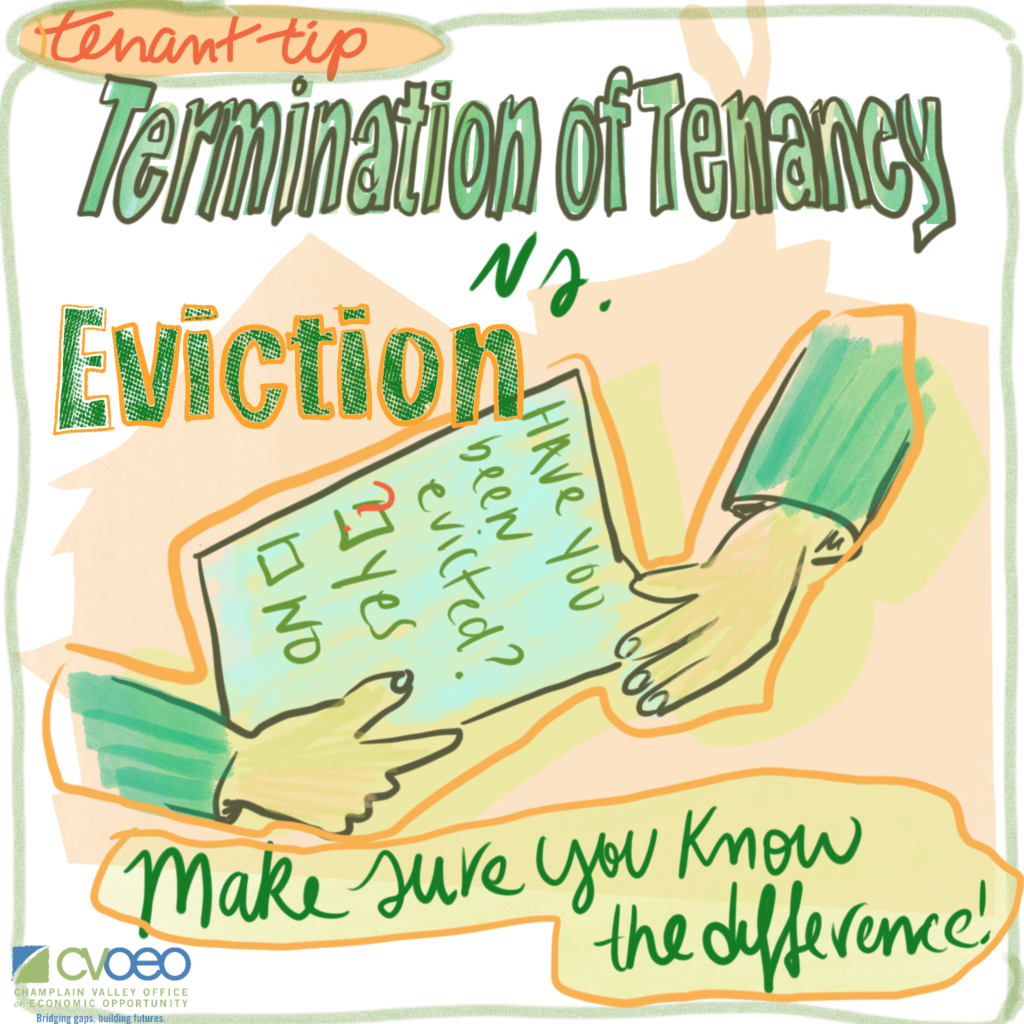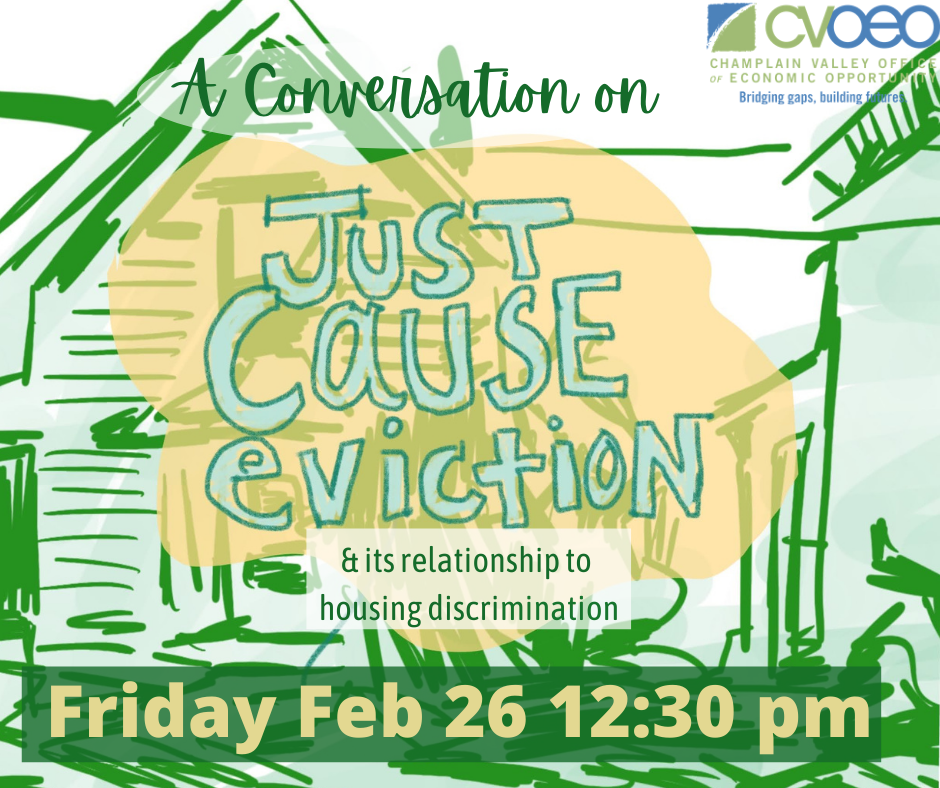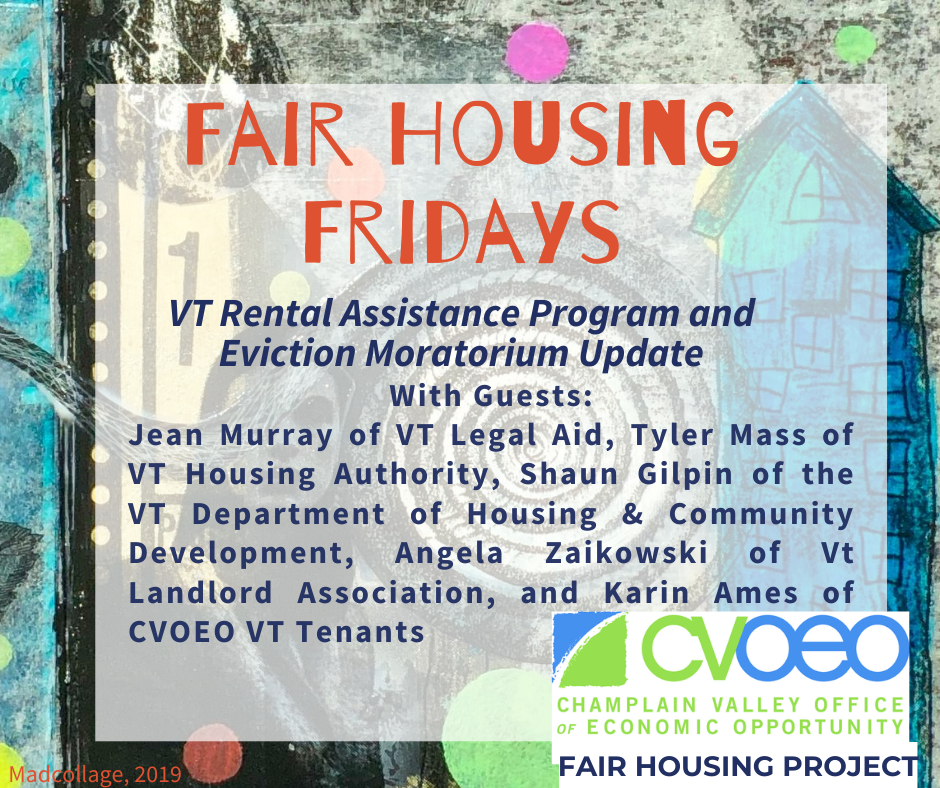Continue reading We Stand with the Tenants of 300 Main St. in Winooski
Category Archives: Eviction
What does the new CDC Eviction Moratorium Mean for Vermont?
This Q & A was created by Jessica Radbord, Esq. of Vermont Legal Aid
The CDC issued a new order temporarily halting evictions in counties with substantial levels of COVID transmission. As of Aug. 5, Bennington, Chittenden, Franklin, Grand Isle, Orleans, and Washington counties are covered. You can find the covered counties on this map: https://covid.cdc.gov/covid-data-tracker/#county-view.
-
How long does the new eviction moratorium last?
-
Until October 3 at the latest, unless a court strikes it down sooner.
-
If, at any point, a county no longer experiences a substantial rate of transmission, the moratorium will expire 14 days later (unless we return to substantial transmission rates during that 14 day period, and then it kicks back in).
-
-
What does the new eviction moratorium do?
-
- It bars a landlord from filing an eviction case if the tenant has asserted their rights under the moratorium. It also stays nonpayment eviction cases already filed if the tenant has asserted their rights.
- NOTE: If a case or notice of termination is for both nonpayment and breach, the case could still move forward based on the breach.
-
Does the new eviction moratorium apply to all eviction cases?
-
- No. It only applies to evictions for nonpayment of rent for eligible tenants who have asserted their rights.
-
Are all tenants eligible?
-
- No. They have to meet the eligibility criteria on the Eviction Protection Declaration Form. The tenant MUST give the form to their landlord to assert their rights to the protection. The tenant should keep a copy of the form. If there’s already a case pending in court, they should submit a copy to the court.
-
-
- If the tenant has a case pending in court, the tenant should call Legal Services Vermont/Vermont Legal Aid at 800-889-2047. When they leave a message, they should say that they have a pending eviction case and their county
-
-
- NOTE: If the tenant is exercising their rights under the moratorium, they are swearing to try to access all forms of rental assistance available. And here in Vermont, that’s VERAP. If the tenant refuses to apply for rental assistance, they should not use the form. They must follow through with applying for VERAP if they are asserting their rights under the moratorium.
-
Should tenants get legal advice before using the form?
- Sure, if they want! Call Legal Services Vermont/Vermont Legal Aid at 800-889-2047. Leave a message as the intake staff are not taking live calls. It can take up to 7 business days to get a callback because of an extremely high call volume. If a tenant is running up against a deadline, they should indicate in their voicemail what deadline is coming up. The intake staff tries to prioritize callbacks where the person identifies a critical deadline. But for the most part, if the person qualifies based on the simple questions on the form and is willing to apply for VERAP, I don’t see a reason not to use it.
The full text of the new eviction moratorium is here: https://www.cdc.gov/coronavirus/2019-ncov/communication/Signed-CDC-Eviction-Order.pdf.
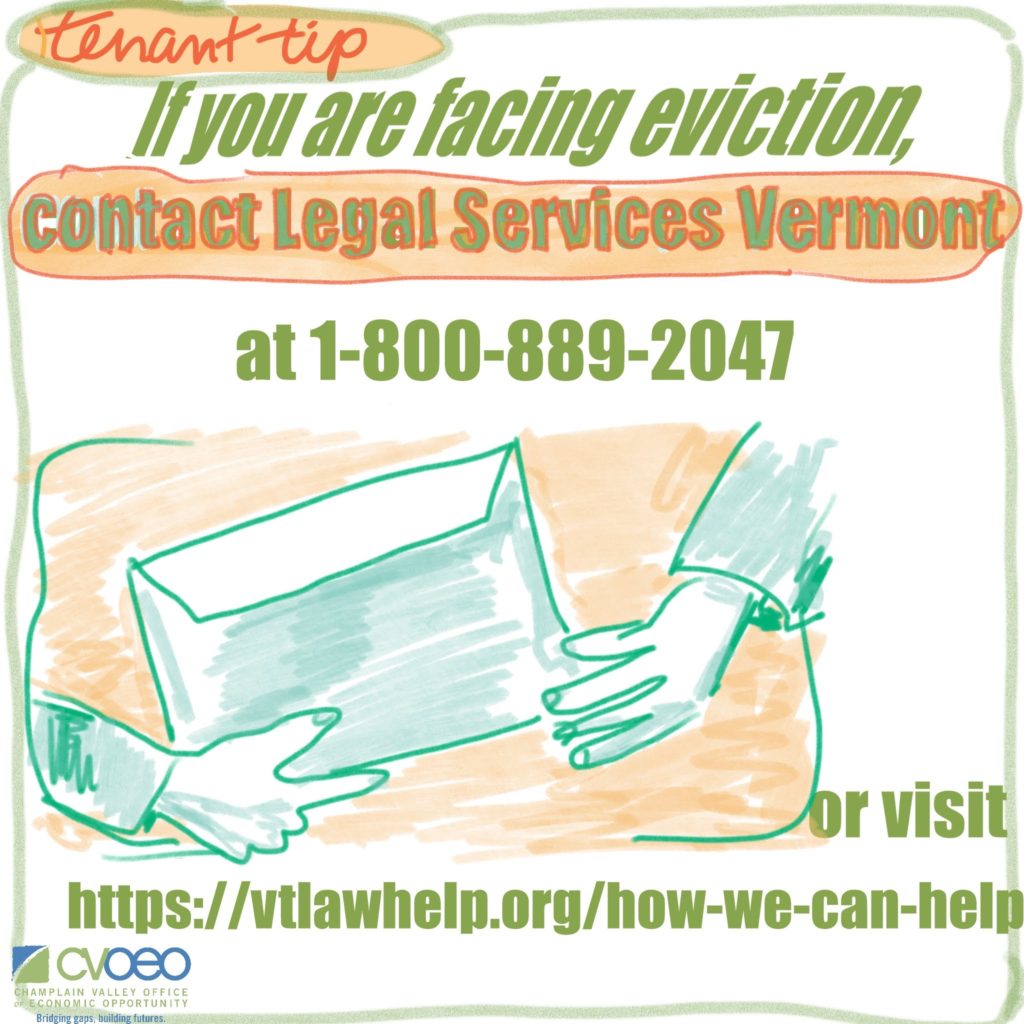
Eviction vs Termination of Tenancy
Make sure you know the difference!
When filling a housing application the question is often asked, “Have you ever been evicted?” Landlords ask this question to determine whether or not you will be a risk to them as a tenant. Negative rental information, such as late or missed rental payments and evictions, can have a huge impact on your ability to find rental housing, get a loan, and other opportunities. The impact is even more devastating when the information is wrong or misleading.
Before answering yes, it is important to understand the difference between “eviction” and “termination of tenancy.”
Eviction is the legal procedure used when a landlord wants a tenant to move out of an apartment. A tenant is not “evicted” until the entire court process is completed, a judge issues an order, and the order is delivered to the tenant.
Examples of what IS NOT an eviction:
- Non-renewal of lease
- A notice to terminate with nothing filed in court
- Any eviction that DOES NOT go through a court process
- Illegal evictions (for example, a landlord attempts to remove a tenant by shutting off the utilities, changing the locks, or moving a tenants belongings out)
Sometimes people refer to a non-renewal of a lease as an eviction. Because the language around eviction is unclear, the terminology often gets used interchangeably, sometimes even by reputable news sources.
Some applications ask: “Have you ever been evicted or have any eviction proceedings ever been started against you?”
This can be unclear to applicants. What constitutes “any eviction proceedings”? Termination notice or actually filing a Summons and Complaint in court? Answer yes only if there has been a filing in court that actually starts a legal eviction.
Using the correct terminology around eviction and termination of tenancy is critical to ensuring housing opportunities for ALL renters.
This is particularly important for Vermonters who face high rates of discrimination, who are at greater risk of being illegally evicted and already face barriers to accessing housing in Vermont.
Resources:
For immediate housing needs, call 211.
If you may be at risk of eviction, seek help now. Call Vermont LegalAid 1-800-889-2047 and our Vermont Tenants Hotline (below).
Have housing questions or concerns? Contact the CVOEO Housing Advocacy Team:
- VERMONT TENANTS HOTLINE: (802) 864-0099, vttenants@cvoeo.org
- PREFERRED RENTER CERTIFICATES + CLASSES: www.cvoeo.org/rentright
- MOBILE HOME PROGRAM HOTLINE: (802) 660-3455 x 204
- VERAP APPLICATION SUPPORT (Vermont Emergency Rental Assistance Program – mobile home lot rent + utilities: (802) 881-6820
- FAIR HOUSING PROJECT: Rights & Responsibilities Education, Community planning resources for affordable, inclusive housing, (802) 660-3456 • fhp@cvoeo.org
- WEBSITE: www.cvoeo.org
The Vermont eviction moratorium expires on July 15, 2021 and the federal CDC eviction moratorium expires July 31. This does not mean that you can be removed from your rental unit right away. You cannot be evicted from your home without a court process. Read more here and contact Vermont Legal Aid for help.
Are you struggling to pay for housing costs due to economic hardship related to the COVID-19 pandemic? You may qualify for help from new assistance programs! If you are a renter, check out the Vermont Emergency Rental Assistance Program (VERAP). If you are a homeowner, click to learn more about the Mortgage Assistance Program (MAP).
Just cause increases household health and stability
This is part of a series of commentaries by CVOEO and Vermont Legal Aid in support of Just Cause Eviction policy. The series includes:
- No Cause Eviction Law is an Unjust Law by CVOEO Executive Director Paul Dragon
- Just Cause is a Racial Justice Issue by Devon Ayers and Erika Johnson of Vermont Legal Aid’s Housing Discrimination Law Project
By Housing Navigator Ryan Murphy and Director Sandrine Kibuey, Housing Advocacy Programs, CVOEO
Thousands of Vermont renters live day-to-day, in precarious housing, uncertain of how they will be able to make ends meet and afford the rent, buy food, or put gas in their car to get to work. It is a constant struggle and COVID-19 has deepened the impact of these daily struggles. The state and federal eviction moratoriums have provided temporary relief to many tenants, but the fear of being evicted is nonetheless real. And on top of it all, the question about why and when is also a great source of stress as a “no cause” eviction is a possibility for all tenants living in Vermont.
Vermont housing law allows landlords to evict any tenant for any reason with as little as 90 days’ notice and no-cause eviction is particularly worrisome for families, older Vermonters, as well as people of color. For many, this experience has been one of extreme consequences; here are a few examples.
Maintenance complaints and retaliation
Jeffrey and his partner, Abigail, received a no-cause lease termination notice this winter after almost a decade in the same home. He was not totally happy with the apartment as the heat had been cutting out, the wooden floors splintered his kids’ feet, and the driveway iced over so badly that he had once fallen and broken his leg.
Jeffrey had verbally complained to the landlord about these issues many times and he even had a few records of his complaints in his email outbox and ‘sent’ text messages. His landlord lived down the block, and Jeffrey felt that hand-delivering a letter, or sending one via certified delivery, might come off as petty and antagonizing but finally decided to send one.
It was hard not to feel like the eviction notice had come as retaliation for frequent repair requests. In Vermont, landlords are prohibited from practicing this kind of retaliation, but there is no mechanism to stop them from delivering no-cause termination notices. If the landlord’s case against Jeffrey went to court, Jeffrey might stand a chance of winning. Because of COVID, though, eviction cases are “stayed.” Technically, Jeffrey and his family could stay in the apartment until the end of the moratorium, but then they could risk getting an eviction for cause as holdover tenants and ruin their housing history for a long time.
It was clear to Jeffrey and Abigail that they needed to line up a new place to live. After weeks of scouring the internet for available, affordable apartments around Burlington, they made the difficult decision to put down a deposit on a place in a neighboring state. They did not see the benefit of engaging in a big fight to stay in a home that would still need many repairs and a landlord resenting them, refusing to address these habitability issues.
From stability to eviction
On the last day of 2020, John’s family received a no-cause lease termination notice. It was yet another difficulty in a challenging year. John imagined trying to explain his current situation to the person he’d been only 12 months ago.
In March, John had been furloughed from his lucrative job as a contractor, and then he had been let go entirely. His job had been the family’s sole source of income. John had always made enough money to take care of himself, his wife, and his kids. Despite his job loss, he was grateful that he had enough in his financial safety net to keep current on rent for a couple of months until the pandemic ended.
A couple of months turned into a few, so John and Michaela applied for the Rental Housing Stabilization Program. They’d never had to apply for any kind of assistance before, but the deal was too good to pass up. The money would cover four months’ rent in full as long as their landlord agreed to sign their application. The landlord did agree to sign it, but in doing so, saw that the couple was in dire financial straits.
John finally found work again, though at a lower salary. His paychecks went towards paying off past-due medical bills and the credit cards that had been maxed out buying groceries and gas. Interest kept accruing and so many creditors called that he and Michaela couldn’t tell which were legitimate and which were scammers.
Then then the car got repossessed. John’s credit score took a 100-point nosedive. He still needed to get to work and couldn’t deal with another monthly debt payment, so he found a car on Craigslist and bought it outright. Registration, titling, and inspection would cost the equivalent of 16 hours’ pay assuming that nothing needed repair.
Then, in December, he was holding a piece of paper that ordered his family to pack up and leave in 90 days. In agreeing to the Rental Housing Stabilization Program, John’s landlord had agreed not to evict him for nonpayment, but there were no protections against no-cause eviction. There was also a statewide eviction moratorium, but it was slated to end two weeks before the day the needed to be out. Although John’s family could only be forced to leave their home through a court order, staying in their home past the date on the eviction notice could cause them to be evicted for cause as holdover tenants.
With a low credit score, low income, and an eviction proceeding hanging over their heads, John was not hopeful about their prospects. It was completely defeating. He had never worked so hard in his life, but the more he tried to keep his family afloat, the more they only seemed to get further underwater.
Eviction is a traumatic event with lasting effects on a person and family’s emotional, social, and physical well-being. These conditions affect a person’s ability to lead a healthy life and deepen health disparities. Voting “yes” for just cause eviction would offer renters a modicum of security by requiring landlords to provide a good reason for evicting their tenants. Just cause would increase overall housing stability, which leads to stronger and more vibrant communities.
To learn more about this issue, view the Feb. 26 Fair Housing Friday webinar.
Fair Housing Friday: Just Cause Eviction & Why It is Important for Housing Equity Feb 26
Join us for a lunchtime conversation on Just Cause Eviction on Friday, Feb. 26 – 12:30-1:30pm.
Panelists include Brian Pine, speaking on behalf of the Just Cause Coalition, Michael Monte from Champlain Housing Trust, Bor Yang from the Vermont Human Rights Commission, and Christie Delphia from the Burlington Tenants Union.
This conversation will highlight the ways language similar to Just Cause is already being used by nonprofit housers across Vermont, why evictions should be avoided & when they are actually necessary, and how Just Cause can combat housing discrimination. This lunchtime conversation will be recorded and have time at the end for a Q & A session.
Register using this link: https://us02web.zoom.us/meeting/register/tZIvd-2hrDovG90HXUx0PDe1zXZYj6e7HHnI
And you can share our facebook event here:
http://https://www.facebook.com/events/451236372739293
Regarding the Just Cause Opposition’s recent disinformation campaign:
On Monday Morning of February 22nd, leaders from Rights & Democracy VT, Vermont Affordable Housing Coalition, The Black Perspective, Burlington City Council, Burlington Tenants Union, Burlington VT Democrats Vermont, state representative Kesha Ram -among others- came forward to address a recent disinformation campaign lead by the opposition to Just Cause. Leaders condemn the red lawn signs designed to scare tenants, spread baseless statements and co-op racial equity language.
And here is the Vermont Affordable Housing Coalitions response to this recent smear campaign: https://www.vtaffordablehousing.org/2021/02/19/the-vermont-affordable-housing-coalition-fully-supports-the-burlington-just-cause-charter-change-proposal/
ROUND UP: Rental Stabilization Program
COVID-19 takes its greatest toll on the most vulnerable, oppressed, and marginalized in our communities.
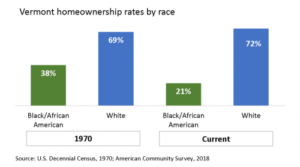
The National Fair Housing Alliance reported an uptick in housing discrimination complaints throughout the pandemic, some of our hardest hit communities nationally included homeless populations and low-income, essential workers, the pandemic disproportionately affected people of color and housing advocates argue the nation’s history of housing segregation is at fault. The pandemic has forced our housing communities to adapt in many ways.
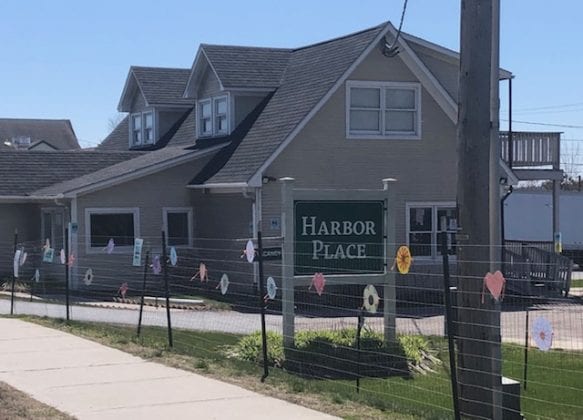
The good news is that here in Vermont we have pulled out some remarkable solutions. This spring housing advocates effectively temporarily ended homelessness in our state. Our own Champlain Housing Trust garnered national attention with this Shelterforce article for its ingenuity with the pre-exisiting Harbor Place, a former motel purchased by Champlain Housing Trust to provide services and transitional housing to homeless individuals. In Woodstock, a mutual aid group, the Woodstock Area Relief Fund, raised $320,000- nearly half of which went to rent and mortgage relief. Vermont passed an eviction moratorium, a critical but complicated law which gave renters much needed relief during a time when unemployment was skyrocketing and many did not know when they would return to the workforce. In April we hosted a Fair Housing Friday about renters’ rights during COVID-19 highlighting the eviction moratorium, which has been extended to Sept. 30. New reports show that Vermont has the 2nd lowest rate of pandemic-related housing insecurity. And this month the Rental Housing Stabilization Program started receiving applications.
If you missed our most recent Fair Housing Friday webinar about the Rent Stabilization program, you can watch the full video here.
The Rental Stabilization funds landlords on behalf on tenants who are in need of help paying past due rent. The program is intended to prevent folks from being evicted so that people can safely shelter in place during the pandemic. For this reason, people can apply even if their rental arrearage is not strictly related to the pandemic and *may* be able to use the program for back rent from before the pandemic. Both the tenant and the landlord have to apply. The program has $25 million and applications are first come, first serve. Applicants have to be income-eligible and their rent has to meet the affordability requirements set by Vermont Housing Finance Agency, about $1,464 for a two-bedroom apartment in the Burlington and South Burlington area, and $1,199 for a two-bedroom in Central Vermont. Two weeks into the program, already an estimated 1,400 households applied for rental assistance.
Some of the questions asked during the webinar:
Q: If I have two tenants behind on rent applying for Rental Rehabilitation program and I only want to keep one of the tenants as a renter, can I apply for one renter and not the other?
A: That sounds like a violation of the Fair Housing Act. It would depend on the situation, and we caution everyone to head state and federal fair housing laws that protect against specific tenants from protected classes.
The point of the program is to provide rental arrearage money so that everyone stays housed where they are.
Q: A lot of the callers to Vermont Tenants hotline don’t have access to the internet and won’t be able to download even a pdf of the application. Where would we refer folks for assistance?
A: You can download the pdf on your phone using mobile data. If you are unable to do that, you can work with your landlord to get the application, call Community Action, call Vermont LegalAid, or call the Vermont State Housing Authority for the application to get mailed to you.
Q: What is the turnaround time for the application?
A: There are 10 working days for Vermont State Housing Authority to respond to the application, which may be a confirmation of a yes – in which case the payment will go directly to the landlord on the 1st and 3rd week of the month, or it may be a referral to Vermont LegalAid.
Q: Will tenants be denied if they indicate on the application that their rent is unsustainable?
A: No. That question is there only if people have the option to move to a more affordable place, and needs help to pay for rent for a more affordable apartment.
Q: If a tenant has already submitted their portion of the application and the landlord has not, how does the tenant move forward?
A: The Vermont State Housing Authority will match applications. If we are not able to get the landlord portion of the application, we will refer the tenant to Vermont LegalAid. If your landlord says they won’t submit an application, you can ask them to call the Vermont Landlord Association. Ultimately, a landlord cannot be forced to apply for the program.
The Vermont State Housing Authority has a full FAQ page which can be found here.
Applications for the Rental Stabilization Program can be found here.
There were a lot of resources we referenced in the webinar, and the full list has been uploaded here.
Always, we ask that if you have questions or concerns about your tenancy, please call our Vermont Tenants Hotline at (802) 864-0099
